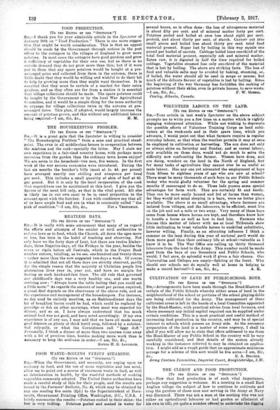VOLUNTEER LABOUR ON THE LAND.
[To THE EDITOR OF THE " SPECTATOR."]
SIR,—Your article in last week's Spectator on the above subject prompts me to write you a few lines on a matter which is rightly engaging widespread attention. While not wishing to deprecate the possible efforts of Volunteer Training Corps as land culti- vators at the week-ends and in their spare time, which you advocate, I would point out that what farmers require is regular everyday labour, so that when the weather permits it may at once be employed in cultivation or harvesting. The sun does not only or always shine on Saturday and Sunday, and so casual labour, only available on those days, would not do much to solve the difficulty now confronting the farmer. Women have done, and are doing, wonders on the land in the North of England, but for many tasks of agriculture they cannot ever be- as useful as male labour. Has any one yet advocated the employment of boys from fifteen to eighteen years of age who are now at school? There must be many thousands of such boys in our Public Schools to-day who would gladly volunteer for the spring and summer months if encouraged to do so. These lads possess some special advantages for farm work. They are certainly fit and hardy. They can be more easily housed and fed at farms than women, for they would not mind sleeping in a barn, were no better place available. The above is no small advantage, where farmers are isolated from villages, and the labourers, to be efficient, must live on the job and not a mile or two away. Very many of these boys come from homes where horses are kept, and therefore know how to handle a horse as well as how to feed him. Farmers who discuss this matter of labour with me at local Tribunals show little inclination to trust valuable horses to unskilled substitutes, however willing. Finally, as an educating influence I think a - summer on the land during this year of national peril would do them more good than their ordinary life at school—valuable as I know it to be. The War Office are calling up thirty thousand labourers from the land to the Army. This number could be made good from the boys of our Secondary and Public Schools, who would, I feel sure, do splendid work if given a fair chance. Our Universities and Colleges are empty—fighting at the front. Why should our schools not do equally well at home in helping to make a record harvest?—I am, Sir, &c., A. K.






































 Previous page
Previous page